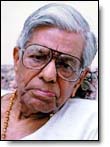'Divisive forces will have to be curbed'
 Former finance minister C Subramaniam
actively participated in India's freedom struggle, went
to prison several times, met Mahatma Gandhi in person and is one
of the few persons from the old vanguard who remain to recall
those tales. Yet, for precisely this reason, he becomes extremely
busy as India's Independence day approaches.
Former finance minister C Subramaniam
actively participated in India's freedom struggle, went
to prison several times, met Mahatma Gandhi in person and is one
of the few persons from the old vanguard who remain to recall
those tales. Yet, for precisely this reason, he becomes extremely
busy as India's Independence day approaches.
There was a big queue of journalists, both from India and
abroad, outside his residence. As a result, a disappointingly
small amount of time was allotted to each journalist. But he walked
Rediff On The Net's Shobha Warrier
down memory lane, as he spoke about his generation and their struggle
for freedom more than 50 years ago.
What are the images that come to mind when you think of
India's freedom struggle?
I had the privilege of being present on the midnight of August
14, 1947, when India was declared a free nation. It was a thrilling
moment. The Constituent Assembly was in session and I was one
of its members. It was on that occasion that Pandit Jawaharlal
Nehru gave his historic address, 'Tryst with destiny'.
Once the meeting was over, Sucheta Kripalani began singing the
Vande Mataram. After Jawaharlal's speech, we took an oath for
the freedom of India and the Indian national flag was hoisted.
The British flag was brought down. And free India was born.
It was a historic occasion for all of us. Not only did India become
free, but it also heralded the beginning of the end of the colonial
era as many other countries gained their freedom. The most unfortunate
part was that free India was born only after India, as a country,
was partitioned.
Was Partition inevitable? We have heard that it took place
because of ego clashes.
Yes, in a sense, ego was involved. In this case, I refer to the
ego of Jinnah. He was very persistent in his demand for the partition
of the country. And the Muslim League backed him. As a result,
partition became inevitable. Otherwise, it might have been averted.
We cannot now envisage what would have happened if we had not
taken the offer at that time and become free.
We have also heard that, earlier, the Hindus and the Muslims
lived peacefully and it was only because of the British divide-and-rule
policy that trouble broke out. Was that the truth?
Yes, yes. As a matter of fact, we have lived together for a long
time. It was only during Aurangzeb's rule that there were clashes
between Hindus and Muslims. Even then, they were not serious differences.
But the British wanted absolute control over India and they adopted
the divide-and-rule policy. Therefore, they encouraged the Muslims
as far as demanding special rights were concerned and that, ultimately,
was how the demand for special rights developed into the demand
for a separate Muslim state (Pakistan).
The British were foreigners and might have had vested
interest in adopting the divide-and-rule policy. But what about
today's rulers? Are they not doing the same thing, that too to
their own country? Are they not dividing their countrymen on religious
and caste lines in order to get votes?
Yes, it is true. But it only refers to some of the parties. The
general trend in the country has revealed an approach for an integrated
Indian society which is not based on various religions, castes etc,
but on a common citizenship for India. Fortunately, all the
governments at the Centre have adopted this policy.
Don't you think they have adopted this policy only in
principle? In reality, we are always reminded that we belong to
a particular caste, religion, etc?
Yes, I agree. That is why it requires much more effort than what
we are putting in today to bring about this integration. These
divisive forces will have to be curbed and that can happen through
enlightened public opinion, more than anything else. And that
public opinion will, I am sure, come about with education and
social and economic development. Then, people will be more concerned
with these developments than with petty quarrels on the basis
of caste and religion. Fortunately, there are positive forces
working against the divisive forces. Ultimately, the positive
forces will prevail.
C Subramaniam's photographs: Sanjay Ghosh
|

